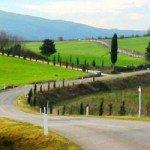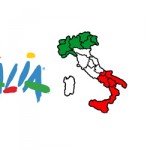So we went to Florence and attended this morning’s parallel session on Internet Better Tourism at ToscanaLab 2010, a meeting dedicated to the web, social media and online communication, organized by Fondazione Sistema Toscana. The heat of the first real summer day in Tuscany has killed my batteries, so I’ll just say what we liked and what we didn’t like about the whole thing. I will get back to the content at another time and I will try to figure out if we are “good web-users” or “new social media-dinosaurs”.
What we did not like
Dulcis in fundo… so we start with the “bittersweet” part:
- the marketing speak with no real examples: there are times when this marketing talk about the need to listen, to act as a system, to be a “we” rather than an “I”, etc. puts me to sleep and gives me the impression of being at some Scientology meeting or some motivational training… I would like to hear about ways in which people put these nice principles into practice rather than the same stuff over and over. Unless somebody shows me how things are (sometimes) done – and how they are different from what we do – these only sound like buzzwords. I know that the theory is that everybody has to find their own way to put this stuff into practice, but unless the theorists start talking in practical terms to the practitioners, there is no room for complaining about small hotels not innovating. If the experts want to see a generalized change, they have to start teaching rather than preaching. I understand that there is no ready made solution, but some case-studies might help people understand what to do.
- old issues presented as new ideas. I appreciated very much what Robert Piattelli said in Grosseto at the meeting Il Futuro della Maremma. He said that nothing has changed. And indeed nothing has, at least in substance. The form has, but the content hasn’t. The various moments of the tourist experience are a well known fact in sociological literature as well as in tourism studies (see Dann’s The Language of Tourism published well over 10 years ago). The need to localize rather than translate web content, especially in the tourism field, has been advocated for a while (a few articles about web translation from the linguist’s perspective were published at least 3 years ago). The need to interact has been addressed for years through forums, communities, and, in the distant distant past, even penfriends and reading groups performed that very same function. The fact that people want an experience rather than a product… well Goethe already knew that when he wrote his Italian Travel Journals and so did all those before him who came to Italy for the Grand Tour… The traveler vs. tourist debate has been one of the liveliest for a long time. If people hadn’t noticed all of that up until now, well, that’s the real problem. The future generations of tourism professionals will need to be formed to be competent in a large range of areas or we’ll keep speaking different languages and looking at a very small and fragmented picture and we’ll forget the bigger picture. Tech-people need to understand marketing people, who need to understand linguists, who need to understand copywriters, who need to understand how the small businesses work everyday and how “Everyman” travels.
- Autoreferentiality: this is a problem that is widespread and often makes me wonder. Today I wish I had seen many more people from the non-digital world: people from public institutions, my students, operators who are not social media experts. Instead, and this is something that always worries me when I tweet for instance, we often preach to the choir. I am under the impression that most of the followers or Facebook friends of tourism businesses are themselves people who are in the business in one way or another.
- Numbers, numbers, numbers: what about conversion rates? It’s great to know that the Google searches for Tuscany-related terms are booming, that people have hundreds of friends in online communities, that people’s blogs are popular. But how much of that popularity becomes actual reservations? In my experience as a vacation rental owner, last year’s season (and this year’s especially) was a disaster. There is nobody around, except in the major centers, which will always be visited no matter what. And yet my websites have never been more popular… could it be that people “travel online” when they don’t have the money to travel for real? I hope not, but these matters are worth looking into.
- Internet not working… come on guys!!! “Internet Better Life” and we couldn’t get online to save our lives?! The wi-fi system should have been impeccable. That’s it. Vodafone did its poor part as usual… we didn’t even have 3G.
What we liked:
- We found the presentations about Google Data, about sociological trends and about the Bologna social media teaching experience extremely interesting and well explained. Bravo. (I apologize but I didn’t write down the names of the speakers and I will have to ask for them.)
- ToscanaLab was a great opportunity to meet interesting people like Roberta Milano, the Social Media Team (Alexandra – @TuscanyArt, Oriana – @Tuscanycious, Erica – @Tuscanytunes in particular are really nice girls and web communicators), Laura De Benedetto, president of ToscanaIn. They are doing terrific work, in concrete terms. I wish I had had more of a chance to interact with them. (And I promise… I did not mean it as a bad thing when I wrote that the Clubs In are a Loggia P2.0!! I was joking! It’s a great idea.)
- I was extremely happy about the fact that the Maremma APT Director, Dr. Francesco Tapinassi, was there. That is what I want to see: the sectors that traditionally stay away from a computer need to get involved and he is doing well in that sense. I hope he will bring social media into the mix.
- The venue: the Gipsoteca is quite impressive.
- The very relaxed atmosphere: everybody was very friendly and truly seemed to enjoy the event. Which is in itself a great merit.
All in all we were very glad we went. I hope events like this really help us non-experts progress.











i’m not sure i’m allowed to comment on this in public so we’ll talk about it over dinner… 😉
but seriously, this is useful constructive criticism. Examples are what make a good speech; I’ve seen a few talks that do include examples of listening and other marketing tactics and it is interesting.
And as for the wifi, INWYA tweeted that they’re ready for all the insults! I really wonder why it is not possible, all good intentions aside, to provide reliable wifi at these events (it’s the same at every event I attend in Italy).
Let’s add to the positive side the turnout: lots of people (500, vs 400 who signed up online), the furnishings (not just the gyposeca but all those Kartell chairs are beautiful, if not uncomfortable…), the food, the general organization.
ps – my mother is now reading your blog.
Oh I’m more than happy to throw a few insults at INWYA, starting with the name: “Informations… Where You Are”. Informations?? Seriously???
I didn’t mean this as a criticism of the event per se. I found it a great idea and a great way to network with people who have similar interests. I also liked many of the presentations as you can see from my “I liked…” list.
ToscanaLab was supposed to give us food for thought I believe, and it certainly did. So in that sense it was a great experience as far as I am concerned. My comments aimed at prompting some further debate.
I would like to make clear that I enjoyed the “whole package” very much, and that I am just trying to figure out what I got out of it and make it part of my daily practice as a researcher and a person in the business.
A great summary of the main points that emerged from the tourism session by Elena Farinelli:
http://elenafarinelli.it/2010/06/29/workshop-sul-turismo-internet-fa-bene-a-chi-lo-usa/
And here Internet Better Tourism Manifesto
http://www.slideshare.net/BTOEducational/internet-better-tourism-manifesto
Both in Italian.
I totally agree with you about “what we didn’t like”. I’ve had enough of “experts” talkin to other expert, I’ve had enough of people saying “we can change everything now”” and doing nothing.
Problem is that, if you say that, everyone looks to you like you’re some sort of “untouchable”, a non-beliver in a very strong curch.
Ciao Lorenzo,
are you saying that I am an untouchable now? :o))
Well I suppose we could try and look at the manifesto and think of ways we can put the 5 points into practice. There, an idea for another post! :o)
Grazie per il commento!
I would like to add that the project I loved from Bologna is called TagBoLab – http://www.tagbolab.it/ and the person who presented it at ToscanaLab 2010 was Michele d’Alena.
Maybe a bit late 🙂 to report our point of view regarding this event… we’d say Google alert is not working properly for us.
Shortly, InWYA was supposed to handle WIFI connections using the bandwidth provided by the organization F.S.T.
We remark “using bandwidth provided by” because we did only have 2Mbit shared by online streaming service and the others 500 potential users (most of them with a wifi device…). Imagine 200 people using your home ADSL connection
We still think we did the best… and we may suggest F.S.T. to organize next events in “better connected venues”.
PS. we provided the “service” for free
PS2. sorry @marcel we’re improving our english 🙂
Sometimes one’s best is not enough… 😉
indeed, not in this case!